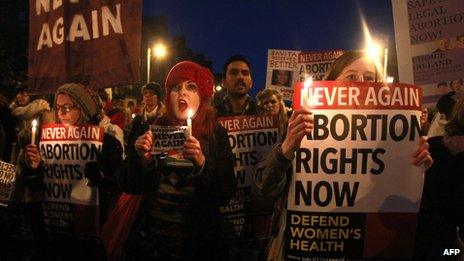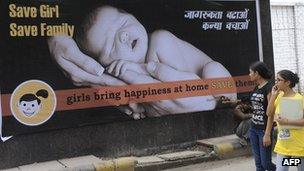Unsafe abortions killing thousands in India
- Published

Ireland is holding an inquest into the death of a pregnant Indian woman last year after she was refused an abortion
An inquest is being held in Ireland into the death last year of Savita Halappanavar, a pregnant Indian woman, after she was refused an abortion. The case has outraged India, but as the BBC's Sanjoy Majumder reports, an alarmingly large number of women die in India because of unsafe abortions.
Inside a small clinic in the town of Jalgaon in Maharashtra, a doctor and his medical staff comfort a young woman who has just come in.
She is clearly in distress and traumatised.
We are told the 22-year-old woman was raped in her village. Now she is five months pregnant and desperate to abort her unborn child, something that is completely legal under Indian law.
But all the doctors she approached refused to help her and she has had to travel to this clinic 90km (56 miles) from her home
"I am too frightened to speak about my situation openly in my village," she says.
"My family will be shamed and no one will want to marry me."
Dr Udaysingh Patil is the gynaecologist at the clinic.
He tells me that he has treated many young women like her who cannot find someone qualified or even willing to perform an abortion because they think it will land them in trouble.
Some of the women are forced to go to backstreet practitioners and by the time they come to him, they are often critically ill.
"They're often bleeding heavily, in shock and sometimes develop infections, including septicemia. It can lead to their death."
Social stigma
Every two hours a woman dies in India because of an abortion that goes horribly wrong. The problem is particularly acute in rural areas where there is little access to quality healthcare.
There is also a social stigma attached to abortion.
"As a culture and society, we refuse to talk openly about abortion," says Vinoj Manning of Ipas, a global organisation that is working to prevent deaths due to unsafe abortions.
"So a woman who wants to terminate her pregnancy often has no one to turn to."

India follows strict anti-abortion laws in an attempt to curb female foeticide
There is also a lack of knowledge about the law.
"Many of our doctors do not even realise that abortion is legal in India," says Subhangi Bhosle, a trainer with Ipas.
The problem is compounded by the fact that pre-natal sex determination tests are banned in India, to curb the practice of female foeticide.
So doctors in small towns or rural areas often believe, mistakenly, that they will face action if they perform abortions.
Inside an operating theatre at a government hospital in Nashik, Dr Vasant Jamdhade talks through a particularly complicated procedure with his young trainees.
The woman he is treating underwent an unsafe abortion elsewhere and has now developed medical complications.
Nurses try and comfort her as the doctor repairs the damage, with the trainees watching intently.
Once they are qualified, his trainees will be sent to primary health care centres in villages, where they can carry out simple but safe abortions.
But there are some who believe the biggest barrier to improving safe abortion practices is prejudice.
"We need to change mindsets," says Dr Bhosle.
"It's such a social taboo that even in our families we don't tell them that we are working to help women have safe abortions."
Back at Dr Patil's clinic in Jalgaon, the 22-year-old woman gets her pregnancy terminated successfully and is recuperating after her ordeal.
She got here in time and survived - she will even be able to have children again.
But many others will not be as lucky.
- Published10 April 2013
- Published9 April 2013
- Published9 April 2013
- Published8 April 2013
- Published8 April 2013